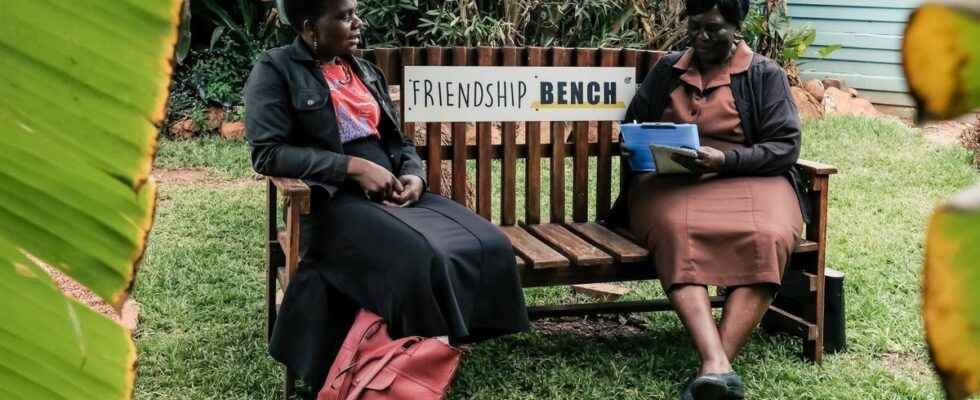Published on
Updated
Reading 2 mins.
Shery Ziwakayi, 70, speaks in a soft voice. His smile is reassuring. Installed in a garden, it is one of the “grandmothers” of Zimbabwe who offer therapy sessions on the public benches of the country, the principle of which will soon win the World Cup in Qatar.
In this poor country in southern Africa, the economic slump of the last twenty years has multiplied the cases of depression and mental disorders. But with a bloodless health system and a large majority of people who often don’t have enough to buy food or electricity, paying for a session with a shrink would be insane.
A Zimbabwean psychiatrist, Dixon Chibanda, came up with the idea of offering free sessions by training older women, affectionately called in the region “mbuya” or “gogo”, in the basics of behavioral psychology.
The benches are spaces “to share stories and by telling these stories, each of us can heal”, explains the doctor to AFP.
Shery Ziwakayi has been sitting on these “friendship benches” for six years and receives an average of three people a day: young people, some suffering from stress or battling addiction. Others are victims of violence, go through financial difficulties or are unemployed.
“Welcome,” she said, shaking hands with her new patient. “You made the right decision to come and see mbuya”.
On a blank sheet, she jotted down the basic questions: “Are you scared of unimportant things? Do you feel exhausted? Do you think about suicide?”
“After speaking, many find themselves recovered and returning to normal life,” the grandmother says.
The idea will be temporarily exported to Qatar during the FIFA World Cup which opens on November 22. Thirty-two benches, as many as there are teams competing, will be set up to raise awareness of mental health issues.
“Simple but strong”
According to the World Health Organization (WHO) which supports this grandmother’s remedy, more than 300 million people suffer from depression in the world.
WHO boss Tedros Adhanom Ghebreyesus hailed “a simple but powerful way to promote mental health”, adding that “just sitting down to talk can make a huge difference”.
In Zimbabwe, some 160,000 people have come to sit on a bench over the past two years, with a spike caused by the Covid pandemic. There are now a thousand benches across the country, frequented by more than 1,500 grandmothers.
In Zimbabwe, only 14 psychiatrists are practicing today, 150 clinical psychologists and less than 500 psychiatric nurses for a population of 16 million, 70% of whom live below the poverty line.
The story began in 2006 with 14 “gogo” in the township of Mbare, the oldest and poorest in the country, located in the capital Harare.
The idea struck Dixon Chibanda after the suicide of one of his patients: “She did not have the 15 dollars to pay for her bus ticket to the hospital and to follow her treatment for depression”, he says .
A click. He then realized “that mental health had to be taken out of the hospitals and into the communities”, he adds, pointing out that six of the ten countries with the highest suicide rates in the world are in Africa.
Choice Jiya, 43, says she owes her life to one of these benches, where she sat on a day of great distress in 2005. Overwhelmed by the birth of twins, when her husband lost his job, she confesses to having thought “that it was better to die”.
She now runs a small perfume and soap manufacturing business.
